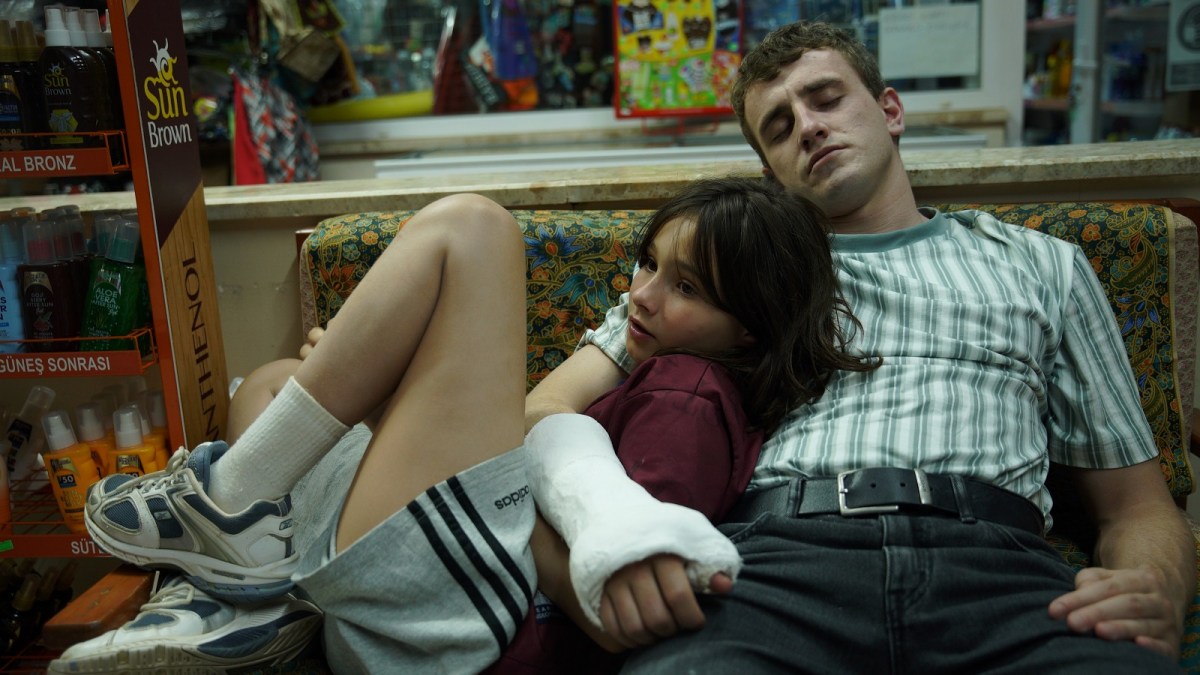Charlotte Wells, writer-director of Aftersun, has created an understated portrait of personal tragedy in this deceptively dark father-daughter team-up. Melding camcorder footage with an absurdly gifted performance from Frankie Corio, it has garnered unanimous adulation from festival audiences, helped in no small measure by the presence of Paul Mescal (Normal People).
As the father figure in this intricately constructed feature film debut, Mescal fulfills every paternal expectation, yet subtly reveals someone perpetually at the point of unraveling throughout. Captured in long takes which find himself and Corio reliving a typical package holiday circa 1990 something, Aftersun carefully documents pivotal moments between them, in an almost haphazard fashion.
Pixilated imagery, seemingly random camera angles, and a charm offensive from Frankie Corio’s Sophie, make it almost impossible to believe Aftersun possesses any formal construction. However, that is what consistently makes this debut from Wells so impressive. As apparently incoherent flashbacks to an unknown rave club combine with long takes of Calum and Sophie engaged in arbitrary activities, the film lulls audiences into a false sense of security.
There are father-daughter bonding moments over Thai Chi and local health treatments, which quickly establish Calum as someone who cares deeply. Formative experiences for Sophie include the requisite first kiss alongside flashes of teenage rebellion, as this duo part company over a karaoke disagreement. Captured in intimate close-up as she systematically destroys a classic track, there is never a moment of artifice on show.
This is where Aftersun consistently excels, effortlessly combining believable emotional beats with an understated technical prowess; one that not only requires a unique screen presence to work, but where a lack of formal construction would challenge even the most accomplished actor. That is why both Mescal and Corio deserve every column inch of recognition coming their way in the coming months.
That it also dips so eloquently into the discussion around identity both sexual and social, adds another arrow to an already impressive arsenal of cinematic riches. In quiet moments away from his role as provider and protector, Calum seeks sexual solace through clandestine encounters – stolen moments of intimacy that hint at the reasons behind his single-parent status. That Sophie quietly observes, passively accepts, and passes no judgment belies her maturity without wasting words or diminishing impact.
As this deceptively simple story continues, Wells gets increasingly adventurous, casting off any desire to spoon-feed her audience. She not only displays a level of trust which leans into visual storytelling without reliance on extraneous exposition, but also prepares people for the emotional hammer blow which slowly gains momentum.
It may yet prove to be the most effective sleight of hand on film this year, as measured and emotive moments between father and daughter now seek to distract rather than entertain. Clues begin to emerge through flashbacks unassociated with the holiday experience. Calum becomes increasingly quiet, while Sophie is more withdrawn and subtly independent. Then there are those moments where a young woman (Celia Rawlson-Hall) grabs the limelight.
These flashbacks might feel fleeting alongside the perpetual onslaught of visual stimulus, but that is where this writer-director lives and breathes. Aftersun is about reflections, both past experiences and personal traumas, which come to shape everyone in their formative years. Memories fade, interpretations change and age provides perspective – a gift all too easily overlooked by the young.
Like all the best childhood memories, Aftersun captures that innocence that comes with new discoveries. Days last a lifetime; tastes are more surprising and holidays are secretly savored – giving everything a rosy hue so often tempered by cynicism in adulthood. This is where the overwhelmingly positive response is coming from, as film festival attendees find themselves vicariously reconnecting to an imaginable ideal.
What Wells has achieved in this feature film debut is nothing short of miraculous. She has tapped into the motherload of universal truths, which is set to see Aftersun transcend cultural differences. Irrespective of nationality, everyone remembers a favorite family holiday, either for good reasons or bad.
It is that emotional thread which has been captured on screen between these two actors, then translated to audiences in the most poignant way possible. By combining her nostalgic take on formative family holidays with an unflinching portrait of conflicting personal identity, Aftersun intentionally delivers an emotional sucker punch few will soon forget.










Published: Oct 14, 2022 12:07 pm